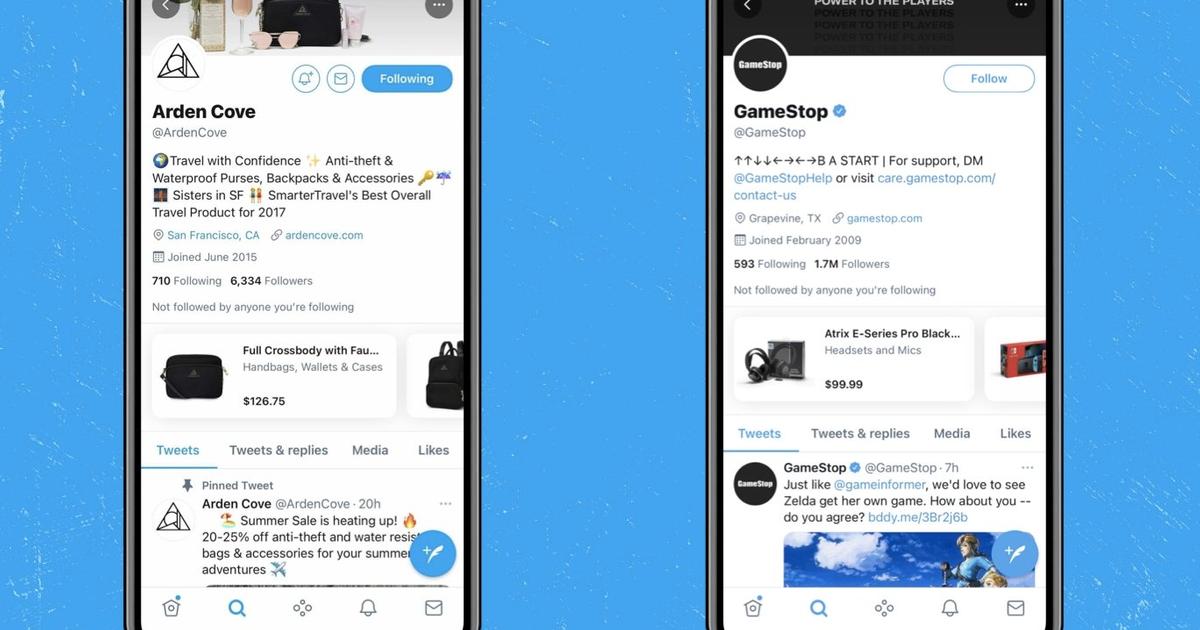
Social commerce—in which customers purchase products through social media platforms—is proving to be the future of the retail industry.
Major social platforms like Instagram, Facebook, Snapchat, and TikTok are all adding digital storefronts to their apps, and customers are following.
According to Accenture, social commerce is expected to grow three times as fast as traditional commerce between now and 2025.
Twitter is the latest social platform to jump into social commerce. The company has quietly been rolling out a series of new Twitter shopping integrations since fall 2021, and brands that use Twitter should keep tabs.
Twitter has several new e-commerce features in development, but the one's brands should be following now are:
The Shop Module is essentially a product carousel that appears at the top of your Twitter profile page.
Brands can display their products alongside an image and the price through the Shop Module. Clicking a product on the Shop Module takes you to a purchase page for that product within an in-app browser.
When Twitter first announced its Shop Module in July 2021, it only allowed ten brands— including GameStop, Walmart, Nike, Patagonia—and Apple iOS users in the U.S. to trial it.
That's starting to change. However: Twitter said in November 2021 that it would soon be bringing the Shop Module to many more brands and users.

Right now, every social platform is investing in live shopping. In November 2021, Twitter conducted the first test of its new Live Shopping tool in collaboration with Walmart. During the live shopping event, the company sold a mix of electronics, home goods, and apparel products.
Twitter and Walmart even had a special guest, Jason Derulo, host a 30-minute variety show highlighting the previously mentioned products. The new feature lets people buy products off of a Livestream in multiple places:
In November 2021, Twitter said that it will introduce a "new way to house merchant onboarding and product catalog management tools."
Essentially, the Twitter Shopping Manager seems to be equivalent to the backend of Instagram Shop, where brands can upload and manage their products, inventory, and sales on the platform.
Twitter will face one problem as it rolls out its new online shopping tools more widely. For most brands, Twitter has never been a great sales converter.
Engagement on Twitter is very low. Even a great post on Twitter will likely not receive more than 0.5% engagement. By contrast, the average engagement rate for U.S. influencers on TikTok was 17.99%.
A single shoppable tweet, in other words, is not likely to drive a lot of product sales on its own, at least not compared to high-converting platforms like TikTok or Instagram.
Instead, brands should look at Twitter first and foremost as a customer engagement platform. Brands join Twitter to build loyalty and create a community with their existing customers.
Here are some examples of brands using Twitter well:
The eyewear company uses its account to recommend glasses to customers. That includes serious recommendations, as well as humorous responses. When users ask Warby Parker what glasses a character in an anime T.V. series would wear, Warby Parker answers.
The skincare brand uses Twitter threads to explain the ins and outs of caring for your skin. Sometimes, it uses Twitter to go deep on certain skin conditions.
A multi-part thread in 2020 garnered significant attention on Twitter, accounting for 70% of Topical's Shopify sales.

If you use Twitter for customer service, it's essential to have knowledgeable customer service agents ready to engage with your followers.
Chatdesk hires customer service representatives who are real fans of your brand to reply to customer tweets, DMs, and branded ads.
For now, Twitter's shopping tools are still in limited beta.
Brands that want to use Twitter's shopping features today should try its Carousel Ad format. Through a Carousel Ad, brands can display multiple products in a single ad. This is currently one of the only ways to refer purchases on the platform.